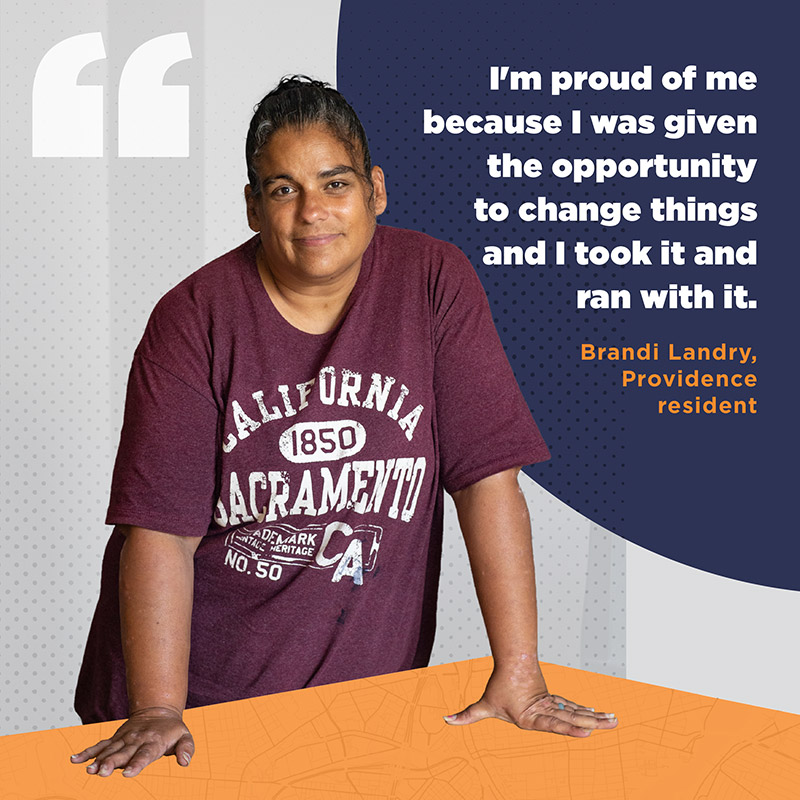
Mayors for Guaranteed Income (MGI) is a coalition of 50-plus mayors who will explore cash payment programs in their cities and advocate for guaranteed income programs. The founding mayors of the network include Michael D. Tubbs from Stockton, CA; Ras J. Baraka from Newark, NJ; Eric Garcetti from Los Angeles, CA; and Keisha Lance Bottoms from Atlanta, Georgia, among others. Additional details about the coalition.
About PVDGI
Guaranteed income (GI) programs provide monthly, no-strings-attached, cash transfers to a targeted portion of the population, mostly those with low incomes and/or experiencing poverty.
Guaranteed income is designed to fill in holes left by other welfare programs. GI programs provide cash rather than vouchers or EBT-type cards, allowing beneficiaries to make their own choices about their priorities and needs. These programs are designed to be low-barrier and to have no requirements that recipients must meet to continue receiving payments. This structure allows for trust and efficiency, eliminating costs associated with traditional welfare programs, and putting those savings directly into the pockets of program participants.
A guaranteed income is not an answer to poverty by itself. Guaranteed income must be paired with other policies that support wealth building in historically marginalized communities. Guaranteed income is not a replacement for the rest of our social welfare system. Guaranteed income is meant to supplement, not supplant, existing welfare programs that millions depend on, such as the Supplemental Nutrition Assistance Program (SNAP), Medicaid, and Social Security.
A guaranteed income is also meant to supplement, not supplant, other income or wages. After one year of the Stockton Economic Empowerment Demonstration, recipients of guaranteed income were 12% more likely to be working full time than at the beginning of the year, compared to only a 5% increase in full-time employment among members of the control group.
In Providence, our pilot was launched entirely through philanthropy. The City of Providence received $500,000 from Square CEO Jack Dorsey and other contributions from the United Way of Rhode Island, Rhode Island Foundation, Providence Community Relief Fund and ONE Neighborhood Builders for a total of $1.1 million in cash and in-kind donations to fund the direct cash payments and administrative costs associated with the pilot program. Recently, the City included an additional allocation of $500,000 from Providence Rescue Plan funds to support the Providence Guaranteed Income program.
The Providence Guaranteed Income pilot program serves 110 households for eighteen months. That scope, while enormously significant to participants, does not meet the needs of our entire community. The goal of the Providence Guaranteed Income pilot program is to display the positive effects and outcomes of guaranteed income and be used to advocate for similar programs at the state and federal level.
Providence residents with an income below 200% of the Federal Poverty level were eligible and encouraged to apply to participate in this pilot. An outside entity will conduct a lottery to select participants from the pool of applicants. Once participants were selected, a second lottery sorted participants into a “treatment group” and a “control group.”
Participants in the control group do not receive a guaranteed income but participate in research activities, such as completing surveys and participating in focus groups and interviews. All participants, both in the treatment group and the control group will receive stipends for each research activity they complete.
The control group allows us to understand the impact of guaranteed income over time amongst two similar groups of people: one who receives guaranteed income and one who doesn’t. For example, in Stockton, researchers were able to show that guaranteed income had a significant impact on full time employment by comparing the change in employment amongst the treatment group and the control group. This allows us to attribute outcomes to the guaranteed income.
The City of Providence and our partners are taking a three-pronged approach to ensure that participants receiving other benefits are not harmed by receiving this guaranteed income. We have worked closely with the RI Department of Human Services to keep guaranteed income from impacting benefits such as RI Works, Child Care Assistance, LIHEAP, and emergency rental assistance. Each participant was able to meet with a Benefits Specialist before enrolling in this pilot. The Benefit Specialist helped them weigh the pros and cons of participating in this pilot and explained how it may impact benefits such as housing vouchers and SNAP. Funds are available to participants if they do experience an unanticipated economic loss from participation in this pilot.
As part of the Mayors for Guaranteed Income (MGI) Coalition, Providence is committed to working with the Center for Guaranteed Income Research, based at the University of Pennsylvania, to build a rigorous and innovative body of research capable of measuring the person-level impacts of guaranteed income.
Mayors for Guaranteed Income and the Center for Guaranteed Income have published a learning agenda, outlining the questions that will guide the design and study of guaranteed income pilots, and the process by which they will be evaluated. With the support of MGI and the Center, a researcher will be embedded in Providence to support the development and monitoring of our pilot to ensure that it advances the learning agenda and provides valuable data on the effectiveness of our guaranteed income program.
There are dozens of guaranteed income pilots in progress across the country, demonstrating the variety in size and scope of guaranteed income programs. For information on guaranteed income pilots across the country, visit https://guaranteedincome.us/.


